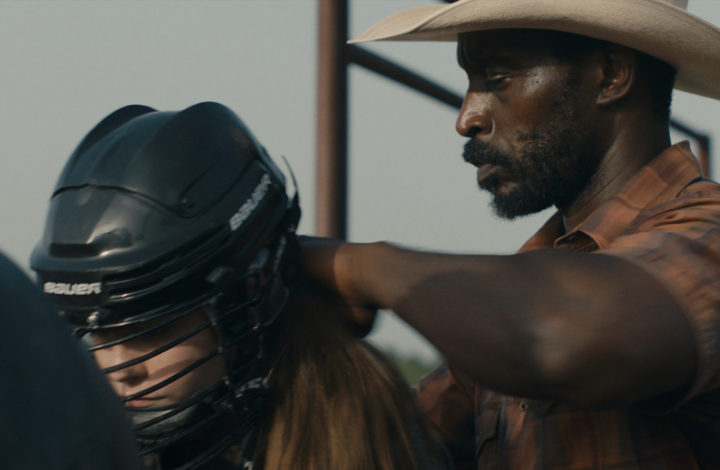
MPAA Rating: | Rating: ★★★★
Release year: 2019
Genre: Coming-of-Age, Drama Director: Annie Silverstein
Debuting at Un Certain Regard at Festival de Cannes 2019, Annie Silverstein’s first feature film Bull is a quietly wondrous coming-of-age tale focused on the unlikely relationship between a troubled young teen and an equally-troubled aging man as both navigate an impoverished corner of the American cultural landscape. If that plot summary sounds familiar, it should: both the content and aesthetic of Bull draw apt comparisons to films like Ryan Fleck and Anna Boden’s Half Nelson, Debra Granik’s Winter’s Bone, Andrew Haigh’s Lean on Pete, and Chloe Zhao’s The Rider. Silverstein’s tender drama joins the ranks of these masterful nu-Westerns, a deconstruction and reimagining of the American mythos via cinematic portrayals of 21st-century cowboys and outlaws. There are no John Waynes or Clint Eastwoods here, only the lingering remains of the American dream.
Bull centers on reticent 14-year-old Kris (newcomer Amber Havard), who lives with her younger sister, Chance (Keira Bennett), and her weary, diabetic grandmother. The girls’ mother is in prison for an unnamed crime, leaving Kris to mostly fend for herself in their backwoods corner near Houston, TX. Her neighbor, Abe Turner (Rob Morgan), is an aging bullfighter in the Texas rodeo world; bullfighters are the individuals in the arena who protect the rider after she or he has fallen off, drawing the bull’s attention away from the fallen person. It’s a dangerous job, and Abe has the scars to prove it. When the unsupervised Kris breaks into Abe’s house and uses it for a party with some other teens, she ends up having to clean the house, drawing her into the world of bull riding and bullfighting where Abe resides. “Can’t you just take me to juvie?” she pleads with the police officer? Jail time seems better than having to clean the chicken coop of her grumpy neighbor, even if she is the one who destroyed it.
With this premise, one might imagine the rest of the story: Abe discovers that Kris is a naturally talented bull rider, and as coaches her to success, they both learn valuable lessons about themselves and each other along the way. But that’s not how Bull‘s story goes. Instead, Bull takes its time to show us this world of African-American rodeos in Texas and the spiritually-orphaned children whose parents are in prison and don’t seem able to (or want to) get out. Indeed, Bull is a haptic film, focusing on the care and abuse of bodies, both human and animal–it is a realm of bruises, both historical and personal. As Abe is black and Kris is white, their bodies define their social landscapes even as both dwell on the same street–there are black rodeos just like there are black churches, a sense of belonging from a shared heritage. “Finally, reparations!” says Abe’s rodeo pal Mike (Troy Anthony Hogan), joking about Kris’ ongoing servitude to Abe. Silverstein directs the camera to stay focused on these characters, who literally embody their performances with a rich physicality. Morgan is especially good as the bullfighter in the ring, at-once powerful and tender with the raging beasts, and some moments feel genuinely thrilling and dangerous. In a quietly intimate conversation, Abe tells Kris how he calms the animals by a gentle touch which alleviates their anger, a soothing tactic Kris utilizes later in a confrontation with a local drug dealer.
Both Havard and Morgan give excellent performances in their respective roles. As I said, Morgan’s physical presence is the perfect balance between ruggedness and gentleness, while Havard appropriately portrays Kris as a typical muted middle school teen, often inarticulate about their internal struggles while nevertheless sharing those obvious struggles via body language and facial cues. In one critical scene, Abe is hesitant about giving himself a shot of painkillers before going into the arena when Kris walks right into his trailer without knocking, asking for ice. When she sees the syringe, she offers to help Abe by giving him the injection, as she gives shots of insulin all the time to her grandma. Though hesitant at first, Abe allows her to jab him. “Are you gonna cry now?” she says straight-faced–it’s impossible to tell if she’s joking or serious, or an adolescent blend of the two. “Get the f**k outta here,” Abe says with a smirk. It’s a kindly cursing, a tender connection between these two lonely souls whom Silverstein has so lovingly created and revealed to us. Silverstein has crafted a sympathetic, affecting nu-Western in Bull, and I can’t wait to see what she creates next.
IMDB Listing: https://www.imdb.com/title/tt10008784/
Leave a Reply